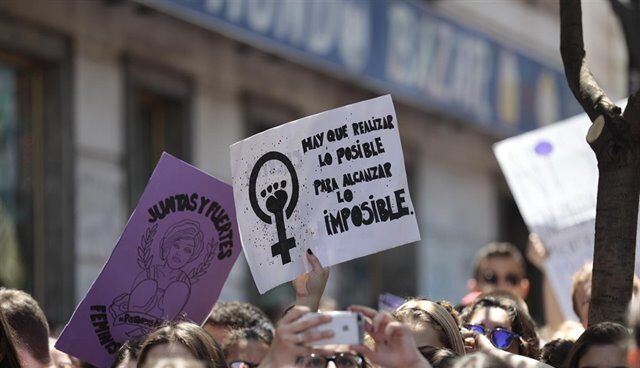

Banners against sexist violence at a demonstration on March 8, International Women’s Day.
More young people are denying or normalizing sexist violence, especially among those 16 and 21 years old. Every fifth young person believes that insulting a partner (22.6%), pushing or hitting after a quarrel (21.5%) is not violence.
While it is true that awareness of sexist violence has increased among the general population in recent years, young people aged 16 to 21 are the least aware and those who have least “gotten” the concept of sexist violence. Here’s what the study says Intolerance carried out by the Mutua Madrileña Foundation and Antenna 3 News.
The youngest denies sexist violence
About a fifth of men aged 16 to 21 believe that they insult their partner (22.6%), push or hit them after an argument (21.5%), threaten them (20.7%) or force them into intercourse in sexual intercourse (17%) this is not sexist violence.
Additionally, a large proportion of the study’s youngest participants, ages 16 to 18, denied that some acts of sexist violence include humiliating their partner in front of family and friends (25%), exercising economic control (35%), or preventing them from studying or working ( 42%).
These are figures that in some cases are double denial of sexist violence among the general population, who 11% of the time believe that insulting a partner is not violence, and also do not believe that physical attacks after an argument (9.4%), threats (10%) or sex without consent (8%).
Moreover, 39% of young people (16-21 years old) and 37% of the youngest people (16-18 years old) are in the groups least concerned about the rise in sexist violence.
Awareness of sexist violence
Despite the youngest data, eight out of ten people in the general population (81%) continue to believe that the problem of sexist violence is very seriousthe same percentage as in the 2022 study. While all age groups consider it very serious or serious, it is the youngest who have the lowest perception of severity.
47% of those surveyed believe there are more incidents of sexist violence than before, and for almost three in four people (72%) it is still considered “unacceptable”.
42% believe that sexist violence can be avoided, and 16% believe that it is inevitable “because it has always existed.”
The study highlights that Men are ‘much less critical’ than women: 64% of them think it is a fairly or very widespread problem, compared to 82% of them. In addition, women are more aware of the seriousness of the problem (89% vs. 72%).
Half the population knows about the upcoming case
Half of the population says they are aware of a recent incident of sexist violence, especially among young people and women, according to a study of 6,000 people.
Although respondents believe that any group is susceptible to this type of violence, young people and people with low educational or purchasing levels are most often mentioned, and they themselves youth (16-21 years old) They consider themselves a very vulnerable group.
For eight out of ten Spaniards (82%), minor children are also victims of sexist violence and are not adequately protected.
In the event of sexist violence, 77% of study participants said they would call the police. But when it comes to reporting, most understand that fear of the abuser, children, economic or emotional dependence, and shame are reasons not to do it.
Micromachisms
Social media and technology have contributed to new forms of sexist violence. among the youngest – 92% of respondents, who in 88% of cases believe that psychological violence is as reprehensible as physical violence, and that it can be even more harmful.
One in four Spaniards (26%) admit that they do not condemn sexist jokes and attitudes. as a breeding ground for gender-based violence, with the percentage falling to 20% among women and higher among young men.
Those surveyed believe that machismo remains the main cause of sexist violence (49%), followed by education (24%).
Finally, regarding the profile of rapists, they are attributed the characteristics of manipulators (79.2%), dominant and aggressive (67.5%), problems with alcohol or drugs (45.6%) and low self-esteem (44.9%).
Source: El Independiente